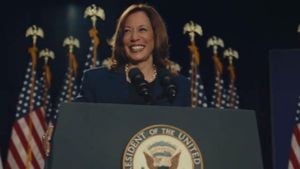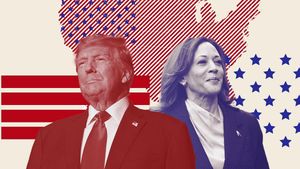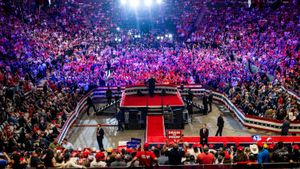Donald Trump has reclaimed the political spotlight, winning the 2024 presidential election with surprising decisiveness. Reports circulate about the Department of Justice's intention to wind down the two remaining criminal cases against him, raising questions about the motivations behind these legal pursuits.
Shortly after Trump was projected to win both the Electoral College and the popular vote, rumors began circulating concerning the Biden administration's DOJ. Sources close to the situation indicated the department is planning to relieve Special Counsel Jack Smith of his responsibilities and close the cases tied to election interference and the handling of classified documents. This shift occurs even before Trump assumes office again, emphasizing DOJ's long-standing policy against prosecuting sitting presidents.
The sentiment of Trump supporters, the commentary from various political analysts, and the nostalgia for his previous term interweave to form the narrative surrounding his recent comeback. Discussion platforms buzz with opinions, including remarks from Megyn Kelly and Rich Lowry on their show about the political ramifications of the DOJ’s actions. Kelly criticized what she termed as politically motivated investigations, denouncing the practices used against Trump as emblematic of authoritarian tactics.
“Look at the audacity of what they did... going after a former president with two federal prosecutions,” she asserted, highlighting the dramatic power dynamics at play. Lowry added it was meant to prevent Trump from launching another presidential campaign. The mindset of many analysts, including former Attorney General Bill Barr, aligns on the belief these actions reflect political ambition rather than justice.
Meanwhile, Trump’s communications team is strategically focusing on his victory’s economic impact, arguing tariffs and trade regulations will revitalize American manufacturing. The value of the dollar surged following the election, initially interpreted as market confidence in Trump’s presidency. Economists, though, argue the dollar's rise links more closely with anticipated inflation from proposed tariff increases than with faith in Trump's management of the economy.
The connections within financial markets are complex. Many investors predict the Federal Reserve will need to counteract inflation stimulated by Trump's proposed higher tariffs, leading to elevated interest rates. Such shifts encourage foreign investment, thereby bolstering the dollar's strength but simultaneously inflaming inflationary pressures for everyday Americans.
Economists from various firms are vocalizing these theories, with analysts observing the potential for traders to purchase dollars early, expecting immediate inflationary consequences post-election. Notably, the implication is clear — the dollar's rise speaks to anticipated challenges to the average consumer, contrasting sharply with the triumphant tone from Trump’s supporters.
On the political stage, Vice President Kamala Harris took the unprecedented step of conceding just hours after Trump’s victory was announced. Her words demonstrated respect for the electoral process many feel has eroded under the past administration. Harris acknowledged the importance of aiding Trump’s transition, emphasizing democracy's fundamental notion of peacefully transferring power, stating, “When you live in a democracy, accepting your losses is what you have to do.”
This starkly contrasts Trump’s historical reluctance to concede and refusal to acknowledge the legitimacy of previous elections. His stance has often encouraged conspiracy theories, resulting in deep partisan divides. The current atmosphere is thick with expectation as Americans, regardless of party affiliation, brace for potential shifts under the Trump administration, shaped by feelings of both jubilation and apprehension.
Adding another layer, Harris’ graceful exit reminds the nation of democratic norms, yet many of Trump's staunch supporters do not view this as necessary. The current straw polls and affiliations among various voter blocs reflect growing polarization, where adherence to traditional electoral processes might clash with fervent party loyalty.
Beyond the electoral narrative, it's the emotional and psychological fabric of Trump's win that's garnering attention. Voters from various demographics paint their support for him as not merely economic but as a rebuttal of political correctness and elite governance. Many see his crude remarks and confrontational approach as refreshing—a direct acknowledgment of frustrations felt by many Americans.
Commentators outline how Trump's brand of political engagement appeals directly to those feeling left behind by conventional political rhetoric. These sentiments gain traction among voters who resonate deeply with his proposed policies, particularly those surrounding immigration and economic nationalism.
Yet, opponents of Trump's policies express concerns about the long-term societal impacts. A growing faction emphasizes the need to rebuild empathy and decency within the political discourse to prevent the erosion of communal bonds. Advocates for political reform argue these societal shifts will demand focus not just on economic policies but also on maintaining moral integrity within democratic practices.
Despite divergent views, both sides acknowledge the impending challenges as Trump returns to power, such as growing inflation, civil tensions, and the enduring impact of international events. The mixed responses may prefigure the tumultuous reality awaiting the next administration.
Harris’ concession and the respective strategies of each party set the stage for growing narrative battles around Trump's policies and their efficacy. The anticipation swirling around how Trump will respond to the challenges he faced previously keeps the political discourse charged.
His track record as president laid bare the duality of his charm and controversy—his willingness to engage directly with his base contrasted with concerning governance issues like handling crises. Therefore, stakeholders and observers alike remain skeptical, weighing potential paths based on past behaviors against forecasts for upcoming policy implementations.
Commentaries from political analysts dissect Trump’s leadership choices, framing them as acts of resilience and aggressive strategy amid widespread accusations of mismanagement. Moving forward, the calls for bipartisanship grow louder, yet stark divisions remain visible; fostering dialogue may very well prove challenging with such entrenched attitudes on both sides.
Examination of social media rhetoric reveals sharp divisions within voter bases—memes portray the cultural clash as rival camps bolster their agendas. Those embracing Trump’s combative approach perceive it as necessary resistance against what they describe as liberal overreach, whereas opponents see it as symptomatic of broader societal decay.
All these dynamics culminate as America prepares for another potential chapter under Trump’s leadership, with each party posturing to optimally position itself within the roaring economic discourse. Questions linger about the authenticity of this economic confidence and how substantive reforms may play out realistically against historical prescriptive commentary throughout established markets.
Street-level conversations among small business owners, employees, and consumers reveal they are not just passive observers of political machinations; their livelihoods hinge directly on who sits at the helm. The palpable anxieties reflect broader economic apprehensions about potential tariff wars and rising product costs, making the stakes feel incredibly high for the average American.
With looming tensions coming from all quarters—whether internal divisions, external pressures from allies, or adversaries—the political discourse will not merely be confined to Capitol Hill. On the ground, many Americans are voicing their hopes and fears on the foundation of the policies to be set forth. Each fresh announcement from Trump's camp is met with heated discussions about the resultant impacts—balancing nostalgia for his previous successes with skepticism bred from controversies.
Both the electoral outcomes and upcoming policy debates will undoubtedly trend toward defining moments, shaping the socio-political atmosphere for the coming years. How this dynamic interplays with grassroots movements, advocacy for social issues, and even responses to international dilemmas remains to be seen.
So, as the United States stands at this precarious juncture, divided sentiments reflect not just the personal and collective hopes of millions but also the stark reality of the political theater waiting to be performed. Will this new administration flourish, or will it be fraught with continued polarization? Only time will tell as the American people engage with these developments.
What is certain, though, is this moment—marked by Trump’s return and the underlying economic discourse—will be closely watched, dissected, and discussed as it carves its place within the annals of U.S. history.



